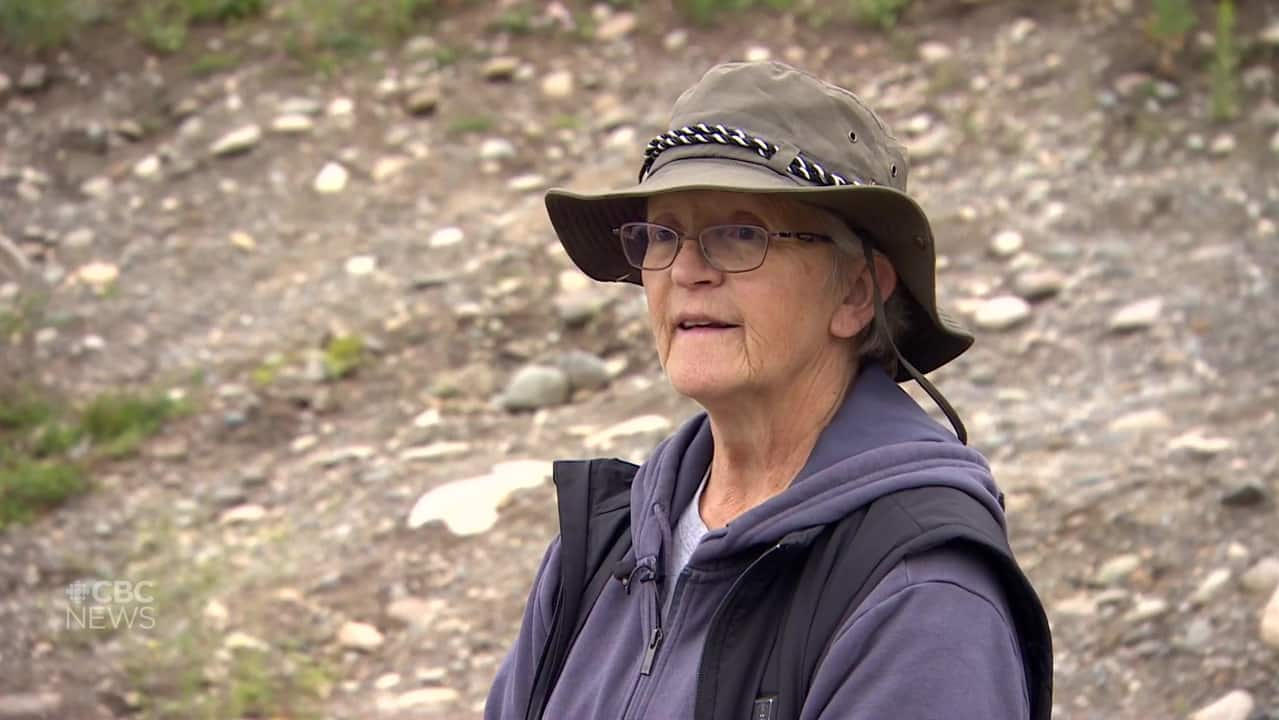Lytton was held up as a future fire-resilient community. Residents say they must first face their own demons

Two years after a wildfire destroyed the village of Lytton, debris from burned-out buildings has been removed, and contaminated soil shovelled and trucked out, leaving behind gaping pits where the foundations of homes and businesses once stood.
Before the dig began in earnest, residents were able to sift through the debris and salvage whatever items may have survived — a ceramic mug, a garden gnome, an Adirondack chair whose green paint melted in the face of extreme temperatures.
The village's state of emergency and evacuation orders were recently lifted. But two years after the catastrophe, not a single building permit has been issued for the village, as the community has worked through bureaucratic loopholes and faced down existential questions about its future.
Residents say with the village still razed to the ground and the cause of the fire as yet unknown, it's been nearly impossible to make decisions about the future, let alone move on.
As Canadian wildfire seasons intensify and communities in other provinces face their own threats, Lytton has been held up as a resilient community — one that lived through the ultimate climate catastrophe but will be rebuilt to withstand the threat of future fires.
For those who fled on June 30, 2021, it feels a bit more complicated than that.
'Head in the sand'
Denise MacIntyre never used to understand hoarders. But these days, she keeps most of her belongings in her truck.
After losing the home where she raised four children in Lytton, she moved in with her mother-in-law. When her children gifted her a framed photograph, a copy of one that burned in the fire, she briefly hung it in her new room.
"I had it up. And then I realized, what happens if we have to evacuate? So that picture is not hanging anymore. I've got it in a duffel bag so it can go with me because I don't want to lose another damn picture," she said.
WATCH | Lytton resident with wood stove talks about her anxiety when it smokes:

Lytton resident describes trauma from fire on 2-year anniversary
On the two-year anniversary of the fire that destroyed the village of Lytton, B.C., residents continue to grapple with symptoms of post-traumatic stress.
MacIntyre was a volunteer member of the Lytton fire department for years. On the day of the fire, as winds akin to a blowtorch spread fire through town, she mustered to fight the flames. She was left with burns on her face and inhaled so much smoke she couldn't cry for help.
Once she managed to flee to safety, she turned away, unable to watch the village burn from afar. But standing by a neighbour who watched their home burn as the family dog remained trapped inside left her with symptoms of post-traumatic stress.
After years of firefighting, she found herself dry heaving and nauseous when her fire pager beeped. When her wood stove lets off the smell of smoke, she experiences panic attacks. The sound of a train rolling by is enough to trigger her anxiety.
"It's been two years, and I'm just starting to deal with it. I'm like an ostrich, sticking my head in the sand and hoping it'll all go away," she said, saying the prospect of rebuilding feels overwhelming even now.
"I've talked to many people in town, and a lot of them are in the same boat. The anxiety that we are all dealing with."
A climate-resistant village
Standing near the centre of town, Lytton Mayor Denise O'Connor hesitates for a moment as she tries to identify where, in a previous version of the village, she might have been standing.
"That was the patio of Klowa Art Cafe," she says eventually, pointing to a hunk of faded cement that previously saw visitors sipping Italian sodas on blistering summer days and sold artisanal jewelry and crafts during the cozy winter months.
The village of Lytton, just seven blocks long, lost the entirety of its commercial core, as well as its police station, fire station, village office, and two museums. Some landmarks are easier to identify than others — like the Lytton pool, still filled with dirty, chlorinated water.
O'Connor said she doesn't know why it has taken so long to get shovels in the charred ground and begin the rebuild, though she's hopeful construction could begin within a few months.
Even so, Lytton residents face an uphill battle to rebuild those homes. Many residents didn't have insurance. The federal government has set aside $13 million for businesses and insured homeowners to rebuild houses that are fire-resistant. But residents must provide the funds upfront and be refunded at a later date, which has proven a challenge for most.
"We heard right after the fire about Lytton becoming a community for the world to look to it. That's not our goal. Our goal is to get the people back and get that community back," she said.
"It's been difficult for everybody. The trauma, the PTSD, is still very real for so many."
A search for accountability has also stretched on with few answers. Many residents believe the fire was started by a passing train with CN or CP rail, theorizing sparks flying from the railway ignited bone-dry terrain, made prone to fire by an extreme heat wave that week.
But in October 2021, Transportation Safety Board investigators said they found no evidence railway activity was responsible.
Since then, the Village of Lytton has filed a lawsuit against its insurer and, along with the local regional district, another against CN Rail, CP Rail, and Transport Canada.
Rosaslin Miles feels like one of the lucky ones. The fire crept up the hill behind her property, destroying a brand new fence, but, miraculously, somehow wrapped around the property and spared her house — a home from the '20s that now stands alone surrounded by charred debris.
For two weeks after the fire, she believed the house was lost. Upon finding out it had been spared, she was wracked by "survivor's guilt."
"I've been calling it the zombie house because it's alive but not livable," she said, though she was relieved to be let back into town to pull weeds from around her house. The knowledge that unkept shrubbery had grown closer to the property, posing a fire risk, was keeping her up at night.
"When I was working the land, it was catharsis. I didn't realize what it meant to me," she said.
Lytton residents want the village to be a warning but also proof that rebuilding after a worst-case scenario can be possible. As MacIntyre walked through the dusty, weedy plot of land where she used to live, she noticed a first — a flower poking up from what for two years had been toxic soil.
And as Miles tore weeds from around her home, out of the corner of her eye, she caught a glimpse of movement — a deer running by.
"It felt like a blessing," she said.
ABOUT THE AUTHOR
Reporter, CBC News
Michelle Ghoussoub is a reporter and anchor for CBC News based in Vancouver. She has received a nomination for the Canadian Screen Award for Best Local Reporter. She can be reached at michelle.ghoussoub@cbc.ca.
*****
Credit belongs to : www.cbc.ca
 MaharlikaNews | Canada Leading Online Filipino Newspaper Portal The No. 1 most engaged information website for Filipino – Canadian in Canada. MaharlikaNews.com received almost a quarter a million visitors in 2020.
MaharlikaNews | Canada Leading Online Filipino Newspaper Portal The No. 1 most engaged information website for Filipino – Canadian in Canada. MaharlikaNews.com received almost a quarter a million visitors in 2020.







